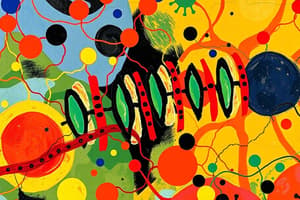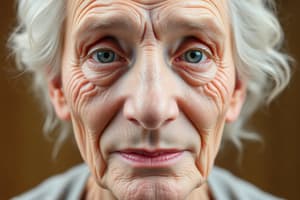Podcast
Questions and Answers
What are the two related theoretical views that form the foundation of biological theories of aging?
What are the two related theoretical views that form the foundation of biological theories of aging?
- Trauma theory and wear-and-tear theory
- Error (stochastic) theories and predetermined aging (nonstochastic) theories (correct)
- Free radical theory and cellular DNA theory
- Wear-and-tear theory and cross-linkage theory
What do both error (stochastic) theories and predetermined aging (nonstochastic) theories agree on?
What do both error (stochastic) theories and predetermined aging (nonstochastic) theories agree on?
- Cells in the body become disorganized or chaotic and are no longer able to replicate (correct)
- Aging is the result of wearing out over time
- The visible signs of aging are solely due to free radicals
- Cellular errors do not impact the aging process
What is the explanation provided by error (stochastic) theories for aging?
What is the explanation provided by error (stochastic) theories for aging?
- Accumulation of free radicals in the body
- Wearing out of cells due to continued use and trauma
- Accumulation of errors in the synthesis of cellular DNA and RNA (correct)
- Cross-linkage of cellular structures
What are three of the most common theories of error according to the text?
What are three of the most common theories of error according to the text?
What is one of the earliest theories of aging according to the text?
What is one of the earliest theories of aging according to the text?
Flashcards are hidden until you start studying
Study Notes
Theoretical Views of Aging
- Biological theories of aging are primarily based on two theoretical views: stochastic (error) theories and nonstochastic (predetermined) theories.
- Stochastic theories focus on random events and errors leading to cellular damage over time.
- Nonstochastic theories propose that aging follows a predetermined genetic program or timeline.
Common Ground Between Theories
- Both error and predetermined aging theories agree that aging is a complex process influenced by both genetic and environmental factors.
- Both recognize that aging leads to a gradual decline in physiological functions and increase in vulnerability to diseases.
Explanation of Aging by Error Theories
- Error (stochastic) theories posit that aging results from the accumulation of errors in cellular and molecular processes over time.
- These errors can stem from various sources such as DNA damage, protein misfolding, and oxidative stress.
Common Theories of Error
- Three of the most prevalent theories in the stochastic category include:
- Free radical theory: Suggests that oxidative stress from free radicals causes cellular damage.
- Telomere shortening theory: Proposes that the shortening of telomeres during cell division limits the number of cell divisions.
- Mutation accumulation theory: Argues that harmful mutations build up in the genome over time, contributing to aging.
Early Theory of Aging
- One of the earliest theories of aging is the "wear and tear" theory, which suggests that organisms have a limited lifespan due to cumulative damage to cells and tissues from environmental stress and usage.
Studying That Suits You
Use AI to generate personalized quizzes and flashcards to suit your learning preferences.




